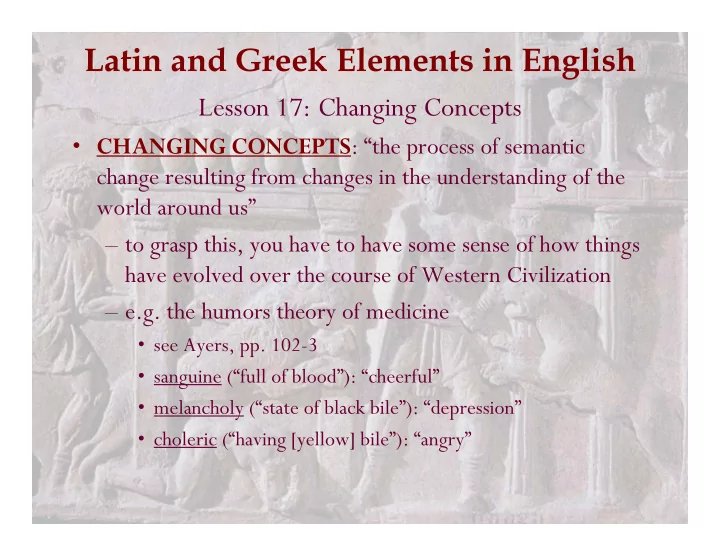

Latin and Greek Elements in English Lesson 17: Changing Concepts • CHANGING CONCEPTS : “the process of semantic change resulting from changes in the understanding of the world around us” – to grasp this, you have to have some sense of how things have evolved over the course of Western Civilization – e.g. the humors theory of medicine • see Ayers, pp. 102-3 • sanguine (“full of blood”): “cheerful” • melancholy (“state of black bile”): “depression” • choleric (“having [yellow] bile”): “angry”
Latin and Greek Elements in English Lesson 17: Changing Concepts • e.g. the classical gods – volcanic: lit. “p.t. Vulcan (god of fire and the forge)” • “related to intense geological activity” – plutonic: lit. “p.t. Pluto (god of the dead and the underworld”) • “formed deep in the earth’s crust, usually by intense heat” – uranoplasty: lit. “the act of shaping ‘Uranus’ (god of the dome of the heavens)” • “surgery on the soft palate”
Latin and Greek Elements in English Lesson 17: Changing Concepts • modern ideas can also change words – e.g. feminism: chairman > chair – also, psychology – and computer terminology • interface: exchange data • bug: problem • crash: suddenly stop working • loop: run in circles • virus: program designed to infect and ruin other systems
Latin and Greek Elements in English Lesson 17: Changing Concepts • Shakespeare’s Hacklet : To boot, or not to boot, that is the query: Whether ‘tis faster in the CPU to buffer The viruses and glitches of pre-released software Or to code fixes against a sea of instabilities And by downloading, zap them. To loop, to crash No more; and by a crash to say we disable The keyboard and the thousand opcodes That silicon is heir to: ‘tis an enhancement Devoutly to be tweak’d. To loop, to crash! To crash? perchance to dump. Ay, there’s the bug.
Latin and Greek Elements in English Lesson 18: Euphemism • literally in Greek “good-speaking” • EUPHEMISM : “the act of replacing a word which is more disagreeable or unpleasant with one that is less so” – also, “the more pleasant word which replaces the less pleasant one” • n.b. “a euphemism”: example of abstract-to-concrete change
Latin and Greek Elements in English Lesson 18: Euphemism • e.g. Eileen’s Lingerie Catalogue featuring Apparel for the “Full-Flowered” Woman – i.e. Sizes 14-26 – small, medium and . . . – majestic! • the doctor who says, “This is going to sting a little.” – in other words, this is going to hurt really bad!
Latin and Greek Elements in English Lesson 18: Euphemism • euphemism is a very old feature of language – associated with word-magic, the notion that words themselves have power – e.g. knowing someone’s name gives the power to control them or their destiny • Odysseus and Polyphemus: Call me “No-one” • cf. Captain Nemo – the names of some Classical deities are euphemisms • the god of the dead = Hades (“The Unseen One”) • the Furies = Eumenides (“The Good-Minded Ones”)
Latin and Greek Elements in English Lesson 18: Euphemism • today, euphemism is most often found around those things with which we are uncomfortable, e.g. death – killing: • to do away with • to put down • to put to sleep – dying: • to pass on/away • the dear departed • the late
Latin and Greek Elements in English Lesson 18: Euphemism • today, euphemism is most often found around those things with which we are uncomfortable, e.g. – sex • to have an affair • to see someone • to do it • to be expecting • to fix, e.g. the cat
Latin and Greek Elements in English Lesson 18: Euphemism • today, euphemism is most often found around those things with which we are uncomfortable, e.g. – toilet • “to do #1” • “to take a rest stop” • “to go to the bathroom”
Latin and Greek Elements in English Lesson 18: Euphemism • the point is not to call unpleasant details to the attention of one’s listeners or to conjure up vivid images in their minds – so what’s the reverse process? “dysphemism”? • i.e. to cause as much discomfort as possible (and laughter!) • e.g. death: “to kick the bucket,” “to bite the big one” • sex: “to test someone’s oil” • cf. Shakespeare ( Othello ): to “make the beast with two backs”
Latin and Greek Elements in English Lesson 18: Circumlocution • the same drive to keep one’s listeners from envisioning unpleasant details leads often to circumlocution • CIRCUMLOCUTION : “an indirect or lengthy way of expressing a simple or concrete idea” – n.b. the point of circumlocution is to avoid the obvious or literal, often to cover up or disguise a truth – e.g. from psychology: “His family is dysfunctional.” – from sports: “He was a little shaken up on the play.”
Latin and Greek Elements in English Lesson 18: Circumlocution • military language is full of circumlocution – “neutralize” = kill – “visit a site” = bomb it artillery – “firepower assets” = yelling – “verbal counselling” = – “dividends” = hitting something
Latin and Greek Elements in English Lesson 18: Circumlocution • military language is full of circumlocution a good place to bomb – “target-rich area” = – “collateral damage from incontinent ordance” = accidentally killing civilians cowardice – “philosophical disillusionment” = – “non-duty non-pay status” = being fired – “confidence building measures” (aka CBM) circumlocutions of this very sort! =
Recommend
More recommend